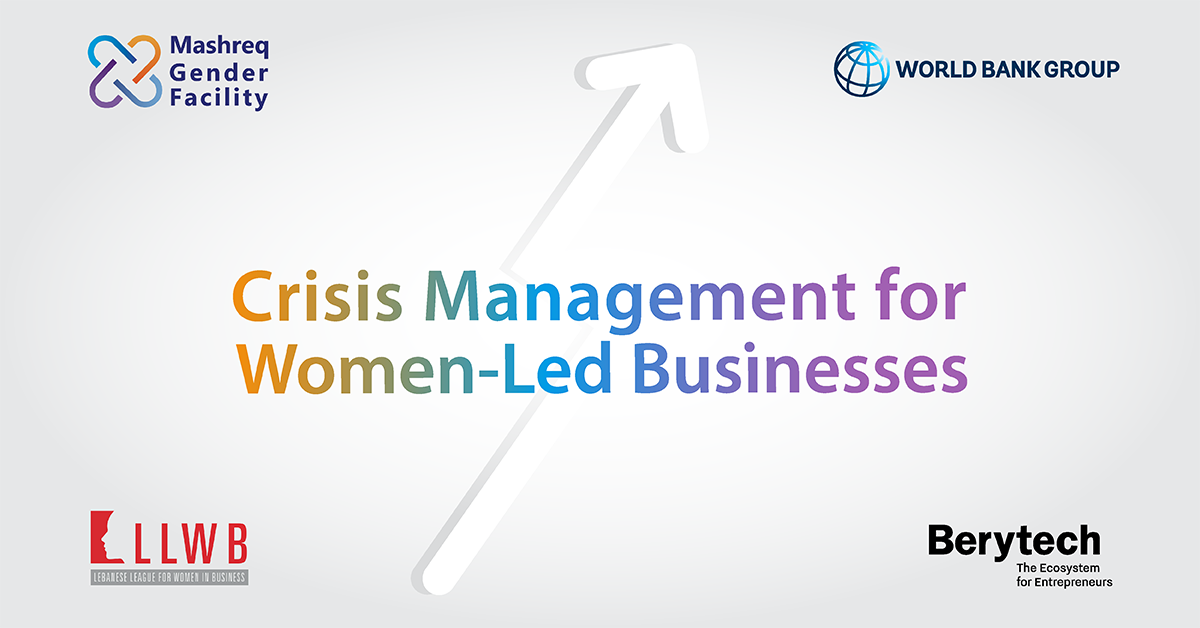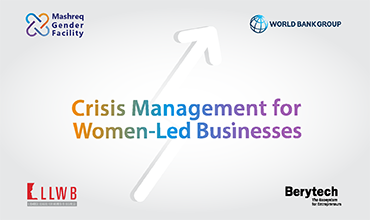
Recognizing the importance of closing economic gender gaps, the Government of Lebanon and the World Bank Group have therefore launched the Mashreq Gender Facility (MGF) in 2019 in collaboration with the Governments of Iraq and Jordan and with support from Canada and Norway. The MGF aims support government-led efforts, country level priorities and strategic regional activities that address constraints to and improve women’s access to economic opportunities
Under this initiative, the World Bank Group has partnered with Berytech and the Lebanese League for Women in Business (LLWB) to provide capacity building in times of crisis for women who want to grow their businesses and enhance their business model, marketing, financing, and networking opportunities, as well as learn how to be resilient in the face of crisis.
Berytech and LLWB will provide women business owners with the needed understanding of the crisis mechanism and the required tools and frameworks to help them understand the crisis impact on their business, and to help them develop adequate mitigation plans to navigate the repercussions of the current crises and ensure sustained operations.
This program, produced as part of the Mashreq Gender Facility (MGF), supports the economic mobility of women in Lebanon, helping them to grow sustainable businesses that are market-oriented, profitable, scalable, and which will facilitate job creation or maintain existing jobs.
Program Background
The share of firms in Lebanon that are co-owned by women is 9.9% according to the World Bank Enterprise Survey (2019). These are typically in lower value sectors and struggle to grow, finding it harder to access finance and markets. In times of crisis, they are hit harder. Recent events in Lebanon have multiplied the challenges facing women-led start-ups and small and medium enterprises.
At the end of 2019, Lebanon was hit by its worst economic crisis since the end of its civil war. The liquidity crunch and economic meltdown left many businesses in the country struggling to survive.
An added layer of challenges emerged due to the recent global COVID-19 pandemic that has swept over the world. Supply chain disruptions and shop closures due to lockdowns have led to dramatic drops in sales and cash flows across Lebanon’s startups and SMEs, which are struggling to pay and retain employees, cover operational costs such as rent, move inventory that is sitting idle due to decreased demand or difficulty to access supplies due to collapsing supply chains.
Insufficient knowledge and tactics by women entrepreneurs to navigate exactly these issues, which are vital for surviving both crises, have resulted in women-led businesses struggling more and being hit even harder. In addition, this pandemic is changing the way businesses are operating. Increased work from home modalities are having huge implications on women with childcare responsibilities. In addition, market opportunities in new sectors, products, services are emerging during the COVID-19 pandemic as a result of shifting lifestyles and consumer patterns and agile companies are starting to re-orient their business to capitalize on these opportunities as a survival and growth strategy. Female entrepreneurs might miss these shifts.
More recently, Beirut was hit with a massive explosion, leading to loss of life, injuries and a devastating scale of damage and destruction. With this new added layer of challenges, businesses now have to learn how to apply post-disaster recovery and reconstruction processes too.
Therefore, it is more crucial than ever to provide women entrepreneurs with the skills and know-how to manage their businesses during these crises – especially when managing their business and family from home – and to provide them with practical solutions to the challenges that affect the short and long-term performance of their businesses.
Training of Trainers Program

The first series of workshops will target advisors who will attend a one-day training-of-trainers (ToT) on ‘Supporting women-led businesses in times of crisis.’ After attending the training day, advisors will receive six coaching sessions to support them in their activities with women-led businesses.
The program is aimed at trainers who will in turn deliver gender-sensitive trainings to women business owners in Lebanon. Eighty (80) representatives of institutions that support women entrepreneurs will be invited to participate in these sessions.
Businesswomen Program

The second series of trainings will target women business owners and women with a leading managerial role in their business. They will learn tools to mitigate the impact of the economic crisis in Lebanon and the impact of the COVID19 pandemic on their businesses, as well as the impact of the Beirut explosion.
The program is aimed at women business owners based in four main regions in Lebanon, Beirut, Beqaa, North Lebanon, South and Chouf.
One hundred and sixty (160) women entrepreneurs will be invited to participate in the sessions. Issues discussed will revolve around leadership in times of crisis, crisis management framework for SMEs, review of the business model, human resources considerations, and if needed, business skills and cash flow and financing.
After their training, the businesswomen will be matched with the advisors trained under the program.
Mashreq Gender Facility (MGF) World Bank – IFC initiative
This Program is part of the Mashreq Gender Facility (MGF). This 5-year Facility (2019-2024) provides technical assistance to Iraq, Jordan and Lebanon to enhance women’s economic empowerment and opportunities as a catalyst towards more inclusive, sustainable, and peaceful societies, where economic growth benefits all. Working with the private sector, civil society organizations and development partners, the MGF supports government-led efforts, country level priorities and strategic regional activities that: (i) Strengthen the enabling environment for women’s economic participation; and, (ii) Improve women’s access to economic opportunities.
The Mashreq Gender Facility (MGF) is a World Bank – IFC initiative in collaboration with the governments of Canada and Norway. It is mainly supported by the Umbrella Facility for Gender Equality (UFGE) with contributions from the governments of Australia, Canada, Denmark, Finland, Germany, Iceland, Latvia, Netherlands, Norway, Spain, Sweden, Switzerland, the United Kingdom, the United States, and The Bill & Melinda Gates Foundation.
Meet Berytech’s Partners
The Lebanese League for Women in Business (LLWB) is a non-profit association founded in 2006 to support women in business and women entrepreneurs. LLWB achieves its mission by providing women with a platform for networking, access to funding, skills development, and mentorship. LLWB has a membership base of 350 women and men, including business owners, entrepreneurs, professionals, and students. The association operates in the areas of Beirut, Mount Lebanon, Beqaa, and North Lebanon. LLWB is working on multiple fronts supporting businesses affected by the ongoing economic crisis as well as by the COVID-19 pandemic. For this purpose, LLWB devised a task force explicitly dedicated to assessing the needs of members during the current situation and design and implement activities tailored for addressing identified needs and challenges.
Eedama is a social enterprise that was formed in 2015 in the UAE as an independent training and consultancy agency to support companies, schools, universities and communities in their sustainability initiatives. Eedama has been developing innovative training material and delivering trainings for both trainers and end-beneficiaries in Lebanon and the UAE. One of its important sectors of activities in the recent years has been socially and environmentally responsible entrepreneurship, working with incubators and business support organizations. Eedama has developed interactive and adapted training content for responsible and sustainable businesses, and its CEO has been mentor for tens of young startups.
Learn more about the Program and how to apply as a Trainer or as a Businesswoman here.








